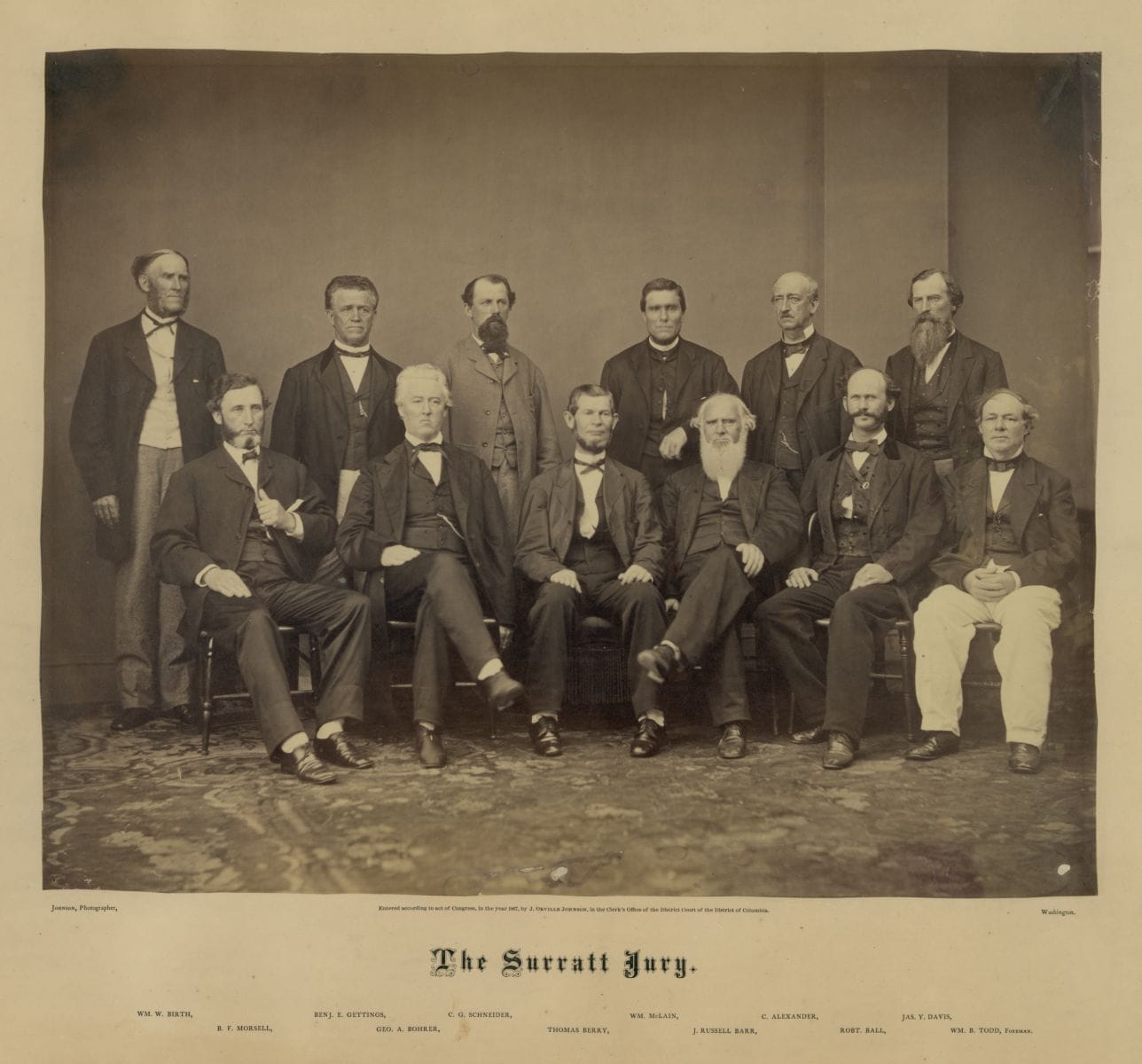Mary Surratt’s last words, “Please don’t let me fall,” uttered on July 7, 1865, as the hangman’s noose tightened around her neck, continue to echo through history. Over 150 years later, these words still haunt us, sparking debate and raising questions about the complexities of our justice system, particularly during times of national crisis.
The Woman at the Center of the Conspiracy
Mary Surratt’s life and death are inextricably intertwined with one of the most tumultuous periods in American history: the assassination of President Abraham Lincoln. Following Lincoln’s assassination, the nation was in shock and reeling from the loss of its leader. In the desperate search for answers and those responsible, all eyes turned toward Mary Surratt.
Surratt, a boarding house owner in Washington, D.C., found herself at the center of the investigation. Her boarding house was a known meeting place for John Wilkes Booth, the assassin, and some of his co-conspirators. This connection, along with her Confederate sympathies, quickly made her a prime suspect in the eyes of the authorities.
A Controversial Trial and a Chilling Sentence
Imagine being Mary Surratt: a woman living in a time when women held little power, suddenly accused of complicity in the assassination of the President. The trial itself was highly controversial. Instead of a civilian court, Surratt was placed before a military tribunal—a decision considered by many, then and now, to be fundamentally unfair. The evidence presented against her was largely circumstantial, relying heavily on the testimony of others connected to the conspiracy.
Despite her claims of innocence, the court found Mary Surratt guilty. She was sentenced to death by hanging, a sentence that shocked many and ignited fierce debate about the fairness of the trial and the severity of the punishment.
On that fateful day in July 1865, Mary Surratt stood on the gallows alongside three other convicted conspirators. Her final plea, “Please don’t let me fall,” has become almost as famous as the crime itself. But what did she mean?
The Enigma of Mary Surratt’s Last Words
Some historians believe her words were simply a final, desperate cry for help, a reflection of the unimaginable terror she must have felt facing her death. They argue that anyone in her position, staring death in the face, might utter similar words, regardless of guilt or innocence. Fear, in the face of such a grim end, can be a powerful force.
Others, however, suggest that Mary Surratt’s words may hold a deeper, more complex meaning. They propose that “Please don’t let me fall” could also be interpreted as a subtle admission of guilt, a plea for forgiveness not just from her executioners but from a higher power. This interpretation sees her words as a final acceptance of responsibility for her role in the conspiracy, however peripheral it may have been.
Adding another layer to this already intricate story is the historical context. The assassination of Lincoln had deeply divided the nation, fueling anger and suspicion, especially towards those with Southern sympathies. Surratt, as someone with ties to the Confederacy, became an easy target for public outrage and a symbol of the perceived treachery of the South.
The execution of Mary Surratt, the first woman ever hanged by the U.S. government, ignited a firestorm of controversy about justice and the use of military tribunals in civilian matters. It forced the nation to grapple with these crucial questions: Was Mary Surratt given a fair trial? Was the punishment, death by hanging, too extreme? These questions remain relevant even today, serving as reminders of the fragility of justice, especially during times of national turmoil.
Unveiling the Truth: Did Mary Surratt Know About Lincoln’s Assassination?
The question of Mary Surratt’s exact role in the Lincoln assassination conspiracy continues to be a subject of intense debate among historians. While it’s clear that her boarding house served as a meeting place for Booth and his associates, the extent of her knowledge about their plans remains shrouded in mystery.
Some historians argue that Mary Surratt was a willing participant in the plot to kill Lincoln, pointing to her Confederate sympathies and her interactions with Booth and his co-conspirators. They suggest that she may have used her boarding house as a safe haven for the conspirators, providing them with information, supplies, or even a place to plan their attack.
Others, however, maintain that Mary Surratt was an unwitting pawn in a much larger game. They argue that, while she may have been aware of some of Booth’s activities, she was unaware of the true extent of his plans. They believe that her Confederate leanings and her son’s involvement in the conspiracy made her an easy target for authorities who were desperate to bring those responsible to justice.
The evidence against Mary Surratt is largely circumstantial. There is no smoking gun that directly links her to the assassination plot itself. The prosecution relied heavily on the testimony of witnesses, some of whom later recanted their statements, adding another layer of complexity to the case.
Adding to the controversy is the fact that Mary Surratt’s trial was held before a military tribunal, rather than a civilian court. This decision, made during a time of heightened political tensions and fear, has led many to question the fairness of the proceedings.
Key Points:
- Mary Surratt’s involvement in the Lincoln assassination led to her trial and execution.
- Her trial was held before a military tribunal, raising fairness concerns.
- Surratt was found guilty despite limited evidence and claimed innocence.
- Her last words, “Please don’t let me fall,” remain enigmatic, possibly expressing fear, guilt, or both.
- Surratt’s execution as the first woman hanged by the U.S. sparked debate about justice and military tribunals.
- Her story highlights the fragility of justice during national crises and the influence of fear and political agendas.
- Her last words continue to serve as a reminder of the human cost of political violence and the enduring mysteries surrounding historical events.
Did Mary Surratt know about the assassination? This question continues to fascinate historians and the public alike. It’s a question that may never be definitively answered. However, by examining the historical evidence and considering the various perspectives on Mary Surratt’s life and death, we can gain a deeper understanding of this complex and tragic event in American history.
If you want to know more about another notorious figure in American history, madame delphine lalaurie was a socialite and serial killer who tortured and murdered slaves in her French Quarter mansion. She was known for her cruelty and sadism, and her crimes shocked the city. Today, her mansion is a popular tourist destination, and her story continues to fascinate and horrify people around the world. For more information about her, click on madame lalaurie.
- Jerry McSorley’s Post-Divorce Life: New Beginnings - July 16, 2025
- The Rise and Fall of the New Haven Nighthawks: A Minor League Hockey Legacy - July 16, 2025
- Unlock Jerry McSorley’s Career Highlights: Eye Tax Inc.’s Solar Success - July 16, 2025
















